-
Paper Information
- Paper Submission
-
Journal Information
- About This Journal
- Editorial Board
- Current Issue
- Archive
- Author Guidelines
- Contact Us
Education
p-ISSN: 2162-9463 e-ISSN: 2162-8467
2018; 8(4): 84-90
doi:10.5923/j.edu.20180804.03

Vocational Homeschooling Educational Ideas Based on Technopreneurship in Jakarta Indonesia
Siska Titik Dwiyati, Ahmad Kholil, Riyadi, Ragil Sukarno
Department of Mechanical Engineering Education, Faculty of Engineering, Universitas Negeri Jakarta, Jalan Rawamangun Muka Jakarta Timur, Indonesia
Correspondence to: Siska Titik Dwiyati, Department of Mechanical Engineering Education, Faculty of Engineering, Universitas Negeri Jakarta, Jalan Rawamangun Muka Jakarta Timur, Indonesia.
| Email: |  |
Copyright © 2018 The Author(s). Published by Scientific & Academic Publishing.
This work is licensed under the Creative Commons Attribution International License (CC BY).
http://creativecommons.org/licenses/by/4.0/

One alternative education applied in Indonesia homeschooling. The pattern of homeschooling learning time independently regulated not tied to the time to study in a regular school. Homeschooling one of the informal education pathways that gives parents the freedom to provide appropriate learning patterns for their children in developing their talents and creativity. The curriculum on homeschooling only limited to the level of elementary school (Paket A), junior high school (Paket B) and high school (Paket C) levels. Whereas for the fulfillment of vocational based education needs at the vocational level there no model yet. At present the students' need for vocational learning with time flexibility a driving force for the growth of alternative schools with vocational choices. Parents who want closeness with children in the midst of busyness want their children to master specific field skills so that one day they can become entrepreneurs, work or continue to University. It is just that it cannot obtained if you only study in general homeschooling. There needs to vocational homeschooling with skill groups such as automotive, machining, makeup, cooking, fashion, and so on. Vocational homeschooling designed equivalent to Paket C so that graduates can continue to college. To produce graduates who have the choice of entrepreneurship, work, or continue their studies at the University, technopreneurship-based vocational homeschooling education becomes a choice for students. The aim of the research to identify the supporting factors of the concept of vocational homeschooling education based on technopreneurship in Indonesia by surveying homeschooling students. The results obtained that the factors supporting the idea of technopreneurship-based vocational homeschooling education (1) there a positive enthusiasm from students to follow the learning process in homeschooling; (2) Very positive interest in homeschooling students to open their own business after graduation; (3) Many homeschooling students utilize technology for entrepreneurial opportunities; (4) Homeschooling students more interested in getting additional learning in the field of technopreneurship; and (5) hobbies favored by homeschooling students greatly facilitated by parents.
Keywords: Homeschooling, Vocational, Technopreuneurship
Cite this paper: Siska Titik Dwiyati, Ahmad Kholil, Riyadi, Ragil Sukarno, Vocational Homeschooling Educational Ideas Based on Technopreneurship in Jakarta Indonesia, Education, Vol. 8 No. 4, 2018, pp. 84-90. doi: 10.5923/j.edu.20180804.03.
Article Outline
1. Introduction
- Homeschooling education model being favored by the Indonesian people, especially in the City [15]. The existing education model only meets the needs of public schools at the elementary, middle and high school levels [12]. One of the Indonesian Government's programs now to increase vocational education graduates through vocational education. At the regular vocational level there several skill groups such as cooking, cosmetology, beauty, automotive, machining, computer engineering, agriculture, and others. Learning carried out for three years with a curriculum that has regulated by the government through Permendikbud No. 24 of 2016. Parents who want their children to have skills than after junior high school will enter their children into regular vocational schools with a learning pattern that has arranged. Whereas parents who want their children to have skills but the pattern of learning time arranged independently cannot choose a regular vocational school. There no vocational homeschooling alternative options at the vocational level for student learning needs with flexible learning time settings. Homeschooling education in Indonesia managed by the Community Learning Activity Center (PKBM) with a range of learning activities level: Elementary School (Paket A), Junior High School (Paket B) and High School (Paket C). The existence of PKBM regulated and protected by the Government which ensures graduates of all programs can continue their education to a higher level, such as Paket C graduates can continue to universities or polytechnics [6]. National Education System Law (sidings) number 20 of 2003, article 27 paragraph 1 that informal education activities carried out by families and the environment takes the form of activities independently. While paragraph 2 that the results of informal education as referred to in paragraph (1) recognized as the same as formal and non-formal education after students pass the exam by national education standards. This proves that homeschooling recognized by the government. Legality recognized as the same as formal education because it can take the exam held by the Ministry of National Education through an equality test. Homeschooling often called a homeschool or independent school, but there no specific definition of homeschooling because the model developed very diverse and varied [6]. The family chooses to take full responsibility for the child's education process with home-based. Homeschooling gives parents the freedom to provide learning patterns suitable for their children in developing talent and creativity [15]. Homeschooling can also be for children with special needs [2, 9]. Homeschooling graduates equivalent to Paket C, which a non-formal education pathway equivalent to high school (SMA) which facilitated by the Government for students who do not study through school channels. Paket C diplomas can continue to tertiary education, most of them accepted at universities in the country, and some accepted abroad. This reason makes parents choose to homeschool as an education for their children. Entrepreneurial creation an alternative solution to various problems in society such as poverty and social inequality, increasing unemployment of productive age and depletion of reserves of energy supply, all of which require creative and innovative actions. The entrepreneurial spirit limited to not only academic intelligence and product-producing skills but also a dynamic soul in capturing challenges and risks then turning them into growth opportunities and potential [4]. Technopreneurship has the spirit to build a business that characteristically the integration of technology application competencies. The use of cutting-edge technology appropriate in the development of businesses based on an established entrepreneurial spirit will able to optimize the process as well as the results of the business units that developed [3]. Also, technopreneurship must successful in two ways, namely guaranteeing that the technology that becomes a business object can function according to needs, target customers and can sell to gain profits and provide benefits or impacts economically, socially and environmentally [10]. Homeschooling students who have a learning independence spirit, demanding creative and innovative actions because the learning system not likes regular schools [15]. They learn by utilizing the technology that around to learn science and skills such as the use of search menus on the internet to find learning resources [11]. By giving vocational curriculum to homeschooling students, students will interact more quickly with the environment in entrepreneurship learning. They will get data on business activities by interacting with business houses for business learning with a touch of technology gained in learning. For example, the parents of a beauty salon businessman want their children to able to continue their parents' efforts at some time. To continue the business, the child must have salon and management skills. To get these competencies, after graduating from junior high school, studying at a cosmetology vocational high school then continuing to study management so that it takes 6 to 7 years to achieve the desired competency. The approach to learning in regular schools more academic and has not able to reach maturity in conducting business independently because of the resolution of cases more theoretical. For this reason, it necessary to find solutions for parents of salon entrepreneurs to able to provide the best education for their children with an education that flexible learning time with a technopreneurship-based vocational curriculum. For that reason, parents enter their children into vocational homeschooling cosmetology education so that children can learn the theory of knowledge and technopreneurship from the teacher and the practice of vocational cosmetology with his parents' mentor as a salon entrepreneur. Theoretical learning more academic while the practice more real because it can work directly in the place of the business of his parents who also mentors. The use of technology in the workplace encourages the spirit to innovate in solving problems in the workplace even though it still under the guidance of parents. In three years competency has achieved because it has able to practice running a parlor business owned by parents and within three years it has also declared a high school equivalent with a Paket C. This diploma can used to continue management studies at universities for thinking maturity in running business parents. This idea is a challenge for alternative vocational homeschooling education in Indonesia. Whether existing homeschooling students support vocational homeschooling ideas.
2. Research Purpose
- This study aims to identify the supporting factors of the idea of vocational homeschooling education based on technopreneurship in Indonesia. With the provision of technopreneurship-based vocational education, students become skilled according to the vocational field, capable of entrepreneurship, and have a Paket C diploma equivalent to high school to enter college.
3. Literature Review
3.1. Homeschooling Education
- Homeschooling an alternative learning model other than in school, parents fully responsible, learning not always with parents as facilitators, the learning environment conducive and the goal that each child's unique potential develops maximally [15, 14]. Viewed from the positive side, homeschooling accommodates the child's potential intelligence optimally because each child has a variety and distinctiveness of different interests, talents, and skills. Also, it able to avoid negative influences that may faced by public school children [16]. From a cynical perspective, it feared that children would alienated from their social environment so that their social intelligence potential does not arise. Homeschooling a proactive action to intervene in the education of our children and responsible for providing love for learning. So that parents can participate to supervise, encourage, explore and develop the potential of their children directly [13]. Homeschooling has several objectives [12], namely: (a) ensure the completion of quality primary and secondary education for students from children and families who choose homeschooling pathways; (b) ensuring equity and easy access to education for each for the process of academic learning and life skills; and (c) serving students who need flexible academic education and life skills to improve the quality of their education. The reason parents choose homeschooling as education for their children is [12]: a. Most parents want to have the opportunity to teach their children by choosing the education that contains elements of religious values and character as well as moral standards in the curriculum. b. With homeschooling that has a tutorial learning system, which is one-on-one, parents can better meet their children's needs by supporting children's interests; each will value curiosity and every child. c. Many think that children who study at homeschooling cannot socialize. It should note that the actual socialization is that children interact with various groups and different ages (vertical socialization), interactive children can not only measure with classmates or their peers in school (horizontal socialization). In homeschooling children are often better at interacting with people of various ages. d. Through homeschooling, parents and children learn, explore, and spend time together. This will further strengthen the relationship between children and parents or siblings.
3.2. Vocational Education
- Elucidation of Article 15 of Law Number 20 of 2003 concerning the National Education System (National Education System Law) confirms that "Vocational Education is secondary education that prepares students especially to work in certain fields." Furthermore, in Article 36 paragraph (2) it is explained that "the curriculum at all levels and types of education developed with the principle of diversification by the education unit, regional potential, and students." Working in a particular field as referred to in the National Education System Law above is undoubtedly by the types of occupations available in the employment field, either working independently or entrepreneurship or working on other parties. Therefore, the application of the principle of diversification in the development of the Vocational High School (SMK) Curriculum is realized by having to be oriented towards the types of work or expertise that are developed and needed in the world of work. The list of types of occupations or expertise in the vocational secondary education environment is known as the Vocational Secondary Education Skills Spectrum. In order to adjust the curriculum with the characteristics of vocational education units, Minister of Education and Culture Regulation No. 70 of 2013 concerning the Basic Framework and Curriculum Structure of Vocational High Schools (SMK)/Vocational Madrasah Aliyah (MAK) which was later changed to the Minister of Education and Culture Regulation Number 60, Year 2014 concerning 2013 SMK/ MAK Curriculum, the attachments related to the Curriculum Structure of SMK/MAK, among others, emphasized that in the determination of majors in accordance with the fields/programs/expertise packages consider the Vocational Secondary Education Skills Spectrum set by the Director General of Secondary Education Ministry of Education and Culture. Based on the Minister of Education and Culture Regulation, the Decree of the Director General of Secondary Education Ministry of Education and Culture issued: 7013/ D/KP/2013 concerning the Vocational Education Skills Spectrum. In this decision, it affirmed that spectrum as intended, is a reference in opening and organizing fields/programs/packages of expertise at SMK/MAK. The skill spectrum of Vocational Secondary Education (PMK) is the types of educational programs as well as the implementation signs, as a reference in the opening and developing education programs at SMK/MAK. The types of education programs in the Spectrum of Expertise organized in the form of Expertise Areas, Expertise Programs, and Expertise Packages. Equipped with the scope of competence for each Expertise Package. a. Areas of expertise, is a collection of Expertise Programs that have similar characteristics and require the same primary field of study. b. Expertise Program, is a collection of Expertise Packages that have the same characteristics of the basics of expertise/ work/tasks. c. Expertise Package, is a unit of education and training program based on tasks in a particular position/job, with a duration of 3 or 4 years of secondary education unit. In each Expertise Package that is opened, Vocational Schools can specialize in specific competencies according to the demands of the related work world (concentration of expertise) by not ignoring the necessary skills of the relevant expertise. The types of education programs in the Vocational High School are called the skill spectrum, because the departments that developed in the Vocational High School are the skills or job titles that exist and develop in the world of work, so it not based on discipline science. A job title or job title (job title) can be the result of focusing on some scientific disciplines.
3.3. Technopreneurship Concept
- Technology-based entrepreneurship or technopreneurship not the same as entrepreneurship in general. Entrepreneurship defined as a process of applying creativity and innovation in solving problems and finding opportunities to improve life [17]. A process of creativity and innovation that has a high risk to produce added value for products that benefit the community [5]. The technological entrepreneurship defined as entrepreneurial activities which involve technology in business. The use of research-based technology the advantage of higher education to develop technological entrepreneurship [17]. Technopreneurship a technology-based business/ incubator, this material model a breakthrough strategy to overcome the increasing problem of intellectual unemployment [8]. Entrepreneurship someone who creates a new business by taking the risk of uncertainty to achieve profits and growth by identifying opportunities and combining various resources [19]. Entrepreneurship the ability to create something new and different [7]. The entrepreneurial process begins with innovation [1]. These innovations influenced by various factors, both personal and outside personal, such as education, sociology, organization, culture, and environment [8]. These factors form the locus of control, creativity, innovation, implementation, and growth which then develop into large entrepreneurs [7]. Technopreneur a new age entrepreneur who interested in technology, creative, innovative, dynamic, dare to different and takes a path that has not explored and very passionate about his work. Technopreneur combines technology and markets, ultimately leading to business. They start a business based on technological innovation, must have some supporters including a strong desire to pursue achievement, conceptual ability, and high problem-solving power, have deep insight and way of thinking, high confidence, tolerance, risk-taking, realistic, interpersonal skills, and controlling emotions. Various ways and models foster new technopreneur that thick with nuances of technological innovation including franchise models, partnership models, mentoring models, business incubator programs, and entrepreneurial education patterns in vocational schools developed by the government and non-government. The incubator program considered to have advantages because there will more professional new startups in the sense of being able to produce goods or services that more competitive. This possible because in the incubator program in educational institutions, startups educated to master all aspects of the business and equipped with facilities and working capital. With the incubator program, entrepreneurs who just starting their business supported by marketing, technical expertise, financing, and business management.
4. Research Methods
- This study focuses on identifying supporting factors for the concept of vocational homeschooling education based on technopreneurship can apply in Indonesia. For that reason, it done by surveying students in one of the Paket C homeschooling in Jakarta. The survey conducted by giving five questionnaire statements like the following: (1) I always eager to follow the learning process in homeschooling; (2) after graduation I will open my own business; (3) I utilize technology for entrepreneurial opportunities; (4) I am interested if there additional learning in the field of technopreneurship; (5) the hobby that I like facilitated by parents. Answer statements consist of strongly agreeing, agreeing, disagreeing, and strongly disagreeing. The answers from each statement then performed statistically to get pie diagrams.
5. Result and Discussion
- Based on the results of a survey conducted by sampling at 30 homeschooling students in Jakarta, the following results obtained. a. The first statement “I am always eager to follow the learning process in homeschooling” show positive things because the majority agree with the statement. Figure 1 shows that 30% answered strongly agree, 63% answered agreed, 7% answered disagree, and no one answered strongly disagree. The spirit of students growing from the application of learning methods to homeschooling is different from regular school learning. Learning methods use a more thematic approach, namely integrated learning that uses themes to link multiple subjects so that they can provide meaningful experiences to students. Student activity material in schools based on themes developed by the teacher, not based on subject schedules. Active Learning, which is learning that requires the teacher to create an atmosphere such that students actively ask questions, build ideas, and conduct activities that can provide direct experience, so that learning is an active process of students in building their knowledge. Constructive learning directs students to be active in developing knowledge, not just waiting for direction and guidance from teachers or fellow students. With this learning, it is expected to be more stimulating and provide opportunities for students to learn, think innovatively, and develop their potential optimally. Contextual Learning is an educational procedure that aims to help students understand the meaning of the learning material they learn by connecting it to the context of their own lives in the social and cultural environment of society. Independent learning can interpret as a process eye, where individuals take the initiative with or without the help of others. Activities carried out by these individuals include diagnosing learning needs, formulating learning objectives, identifying learning resources, selecting and implementing learning strategies and assessing learning outcomes.
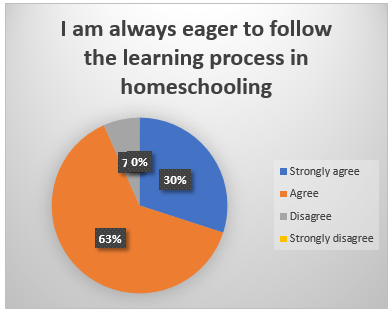 | Figure 1. The answer to the first statement |
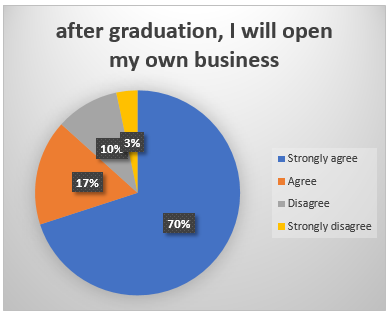 | Figure 2. The answer to the second statement |
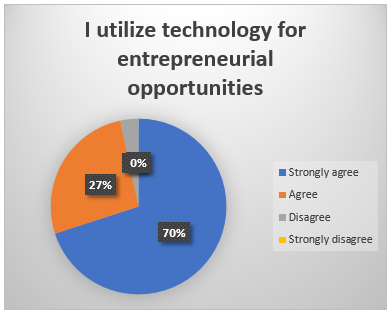 | Figure 3. The answer to the third statement |
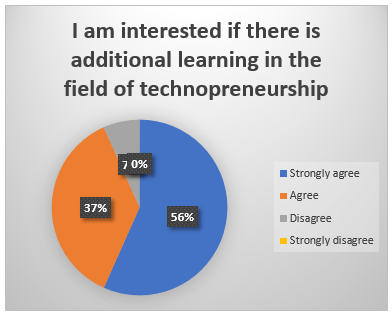 | Figure 4. The answer to the fourth statement |
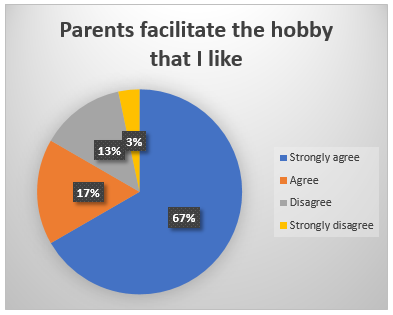 | Figure 5. The answer to the fifth statement |
6. Conclusions
- Technicopreneurship based vocational homeschooling education can applied in Indonesia especially in the City. This can reflected in the results of the questionnaire that has filled by homeschooling students at Jakarta. Support for this educational idea states that: (1) there a positive spirit of students to follow the learning process in homeschooling; (2) very positive interest in homeschooling students to open their own business after graduation; (3) many homeschooling students utilize technology for entrepreneurial opportunities; (4) homeschooling students more interested in getting additional learning in the field of technopreneurship; and (5) hobbies favored by homeschooling students greatly facilitated by parents.For further studies on vocational homeschooling education, further research is needed on how the curriculum, learning method, assessment, and implementation of the technopreneurship model.
 Abstract
Abstract Reference
Reference Full-Text PDF
Full-Text PDF Full-text HTML
Full-text HTML